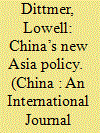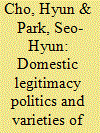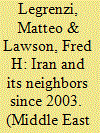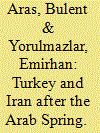|
|
|
Sort Order |
|
|
|
Items / Page
|
|
|
|
|
|
|
| Srl | Item |
| 1 |
ID:
134763


|
|
|
|
|
| Summary/Abstract |
China’s Asian policy has changed significantly since the global financial crisis. Yet the argument here is that in essence, it has not changed. China’s ambition, as first articulated by Mao Zedong, was and has remained to achieve national greatness. Over time, the goal itself has become more focused on China’s own national interests and less on transforming the international order. The means to this end have always been flexible, depending on China’s growth in capabilities and on the opportunities offered by the international environment. In the first decades of the 21st century, China perceived a strategic opportunity to achieve major advances towards achieving this goal, focusing on its immediate regional environment. To do so, it has devised tactics shrewdly designed to do so without precipitating a confrontation with the United States or impinging on its core interests. This “new course” in Chinese foreign policy, addressed primarily to the Asian neighbourhood, was confirmed with mostly cosmetic adjustments in the 2012–13 transition to the fifth generation of the Communist Party of China (CCP) leadership and seems likely to remain in effect for the foreseeable future. The implications of this new Asia policy have already achieved modest success and more importantly no convincing defence has yet been devised.
|
|
|
|
|
|
|
|
|
|
|
|
|
|
|
|
| 2 |
ID:
134759


|
|
|
|
|
| Summary/Abstract |
The rise of China has important implications for the regional order in East Asia. Such implications are not limited to material calculations, such as the size of China’s economy and its military expenditure, but also include an ideational dimension. This article examines the rise of China from the perspective of the recent development of Chinese international relations (IR) theory. Rather than being a purely academic pursuit of theoretical pluralism in the discipline, the development of IR theory in China is also a political practice seeking to address the important problem of China’s rise; that is, the threat perception of a rising power informed by rationalist IR theory. Drawing upon traditional Chinese political thought, Chinese IR scholars have engaged to debate the possibility of a benevolent power within a hierarchical international order, similar to Asia’s historic tribute system. Nevertheless, such a proposal faces limitations, at both the theoretical and practical levels, that cast doubt on the efficacy of (re)creating Asia’s future in the image of its past.
|
|
|
|
|
|
|
|
|
|
|
|
|
|
|
|
| 3 |
ID:
135702


|
|
|
|
|
| Summary/Abstract |
Seizures of amphetamine-type stimulants have increased worldwide and new trafficking routes have emerged. Joanna Wright analyses how regional variations in production are affected by consumption , enforcement, and even civil conflict
|
|
|
|
|
|
|
|
|
|
|
|
|
|
|
|
| 4 |
ID:
135294


|
|
|
|
|
| Summary/Abstract |
What drives East Asian regionalism? The rise of China and the perceived decline in the influence of the United States have sparked debates about the future of the regional order, including the yet-unresolved question of whose leadership is likely to be more stable and accepted as legitimate by other regional actors. What is puzzling, however, is that persistent demands for the formation of a coherent and uniquely East Asian regional institution have come not from China or the US, as is the focus of existing studies, but rather Japan and South Korea. In this article, we propose an alternative framework that conceptualises the varieties of East Asian regionalism, emphasising the multiple pivots and variegated levels of politics involved in efforts toward regional cooperation. We find that competing proposals for East Asian regionalism since the 1990s are not determined by structural pressures or the convergence of interests but rather result from domestic legitimacy politics. Japanese and Korean leaders have, at different time periods, proposed their own alternative region-making initiatives appealing to domestically contested views on how best to seek autonomy from the region's Great Powers as a way to enhance their political standing domestically and regionally.
|
|
|
|
|
|
|
|
|
|
|
|
|
|
|
|
| 5 |
ID:
136602


|
|
|
|
|
| Summary/Abstract |
The discipline of International Relations (IR) does not reflect the voices, experiences, knowledge claims, and contributions of the vast majority of the societies and states in the world, and often marginalizes those outside the core countries of the West. With IR scholars around the world seeking to find their own voices and reexamining their own traditions, our challenge now is to chart a course toward a truly inclusive discipline, recognizing its multiple and diverse foundations. This article presents the notion of a “Global IR” that transcends the divide between the West and the Rest. The first part of the article outlines six main dimensions of Global IR: commitment to pluralistic universalism, grounding in world history, redefining existing IR theories and methods and building new ones from societies hitherto ignored as sources of IR knowledge, integrating the study of regions and regionalisms into the central concerns of IR, avoiding ethnocentrism and exceptionalism irrespective of source and form, and recognizing a broader conception of agency with material and ideational elements that includes resistance, normative action, and local constructions of global order. It then outlines an agenda for research that supports the Global IR idea. Key element of the agenda includes comparative studies of international systems that look past and beyond the Westphalian form, conceptualizing the nature and characteristics of a post-Western world order that might be termed as a Multiplex World, expanding the study of regionalisms and regional orders beyond Eurocentric models, building synergy between disciplinary and area studies approaches, expanding our investigations into the two-way diffusion of ideas and norms, and investigating the multiple and diverse ways in which civilizations encounter each other, which includes peaceful interactions and mutual learning. The challenge of building a Global IR does not mean a one-size-fits-all approach; rather, it compels us to recognize the diversity that exists in our world, seek common ground, and resolve conflicts.
|
|
|
|
|
|
|
|
|
|
|
|
|
|
|
|
| 6 |
ID:
136205


|
|
|
|
|
| Summary/Abstract |
Iranian foreign policy in the 25 years after the 1978-79 revolution centered on the cultivation of strategic alignments with a wide range of radical states and revolutionary movements throughout the Middle East. Relations with this heterogeneous collection of regional partners, particularly those with Syria and the Lebanese Shii organization Party of God (iezbollah), left the Islamic Republic vulnerable to periodic threats of entrap¬ment and abandonment by its allies. This in turn had a direct impact on Iran's relations with regional adversaries
|
|
|
|
|
|
|
|
|
|
|
|
|
|
|
|
| 7 |
ID:
136202


|
|
|
|
|
| Summary/Abstract |
Iran is alone in the world. Its acute strategic loneliness is primarily the result of structural factors inherent in its place in the regional and international systems and is largely independent of the actions of whoever governs the country. Its international posture does not render cooperation with other states impossible, nor does it predetermine a condition of permanent conflict with its neighbors. Strategic loneliness, however, explains why Iran has very limited common interests with its neighbors and why cooperation is difficult and costly to achieve. Tehran's policies, as a result, can worsen or improve the situation but cannot fundamentally change it.
|
|
|
|
|
|
|
|
|
|
|
|
|
|
|
|
| 8 |
ID:
136646


|
|
|
|
|
| Summary/Abstract |
The global order is undergoing a churn and the general pointers forecast an era of a cataclysmic systemic change. The pronouncement of the “Rebalance to the Asia-Pacific”, indicating a shift in US strategic focus to Asia, has captured the imagination of the scholars and the analyst community alike. Within the prevailing nebulous and uncertain global architecture, this strategic recast by the dominant security provider has far-reaching implications. Considering the contextual underpinnings of various policy articulations and the geographic construct of this strategic reorientation, the maritime element would play a crucial role in this re-alignment of US strategic posture. This paper aims to deconstruct the maritime–military context of the US rebalance and draw out necessary implications for international, regional and Indian strategic calculus.
|
|
|
|
|
|
|
|
|
|
|
|
|
|
|
|
| 9 |
ID:
136569


|
|
|
|
|
| Summary/Abstract |
“Latin American nationalism is unique in comparison with the nationalisms of other regions in the developing world because it achieved political independence at least a century before it gained social and economic independence.” Fifth in a series on resurgent nationalism around the world.
|
|
|
|
|
|
|
|
|
|
|
|
|
|
|
|
| 10 |
ID:
136645


|
|
|
|
|
| Summary/Abstract |
As the center of world economic growth and world politics is shifting to East Asia, the region is undergoing a strategic transformation due to the ongoing power shift. As a result, major regional powers, namely the USA, China, Japan, India, South Korea, Australia and South East Asian states are building up their military potential, in particular naval forces, amid aggravating regional security problems and escalation of maritime disputes. This paper aims to assess regional strategies and military buildup in the Indo-Pacific. With the USA seeking to preserve dominance in the region, China trying to realign the regional power dynamics in its favor, Japan aiming to preserve its place as one of the regional leaders, India and Russia with their goals to become independent powers, and middle and small powers searching for an adequate answer to regional challenges, East Asia and the Indo-Pacific are clearly showing a complex dynamics of competing regional strategies and visions of regional order.
|
|
|
|
|
|
|
|
|
|
|
|
|
|
|
|
| 11 |
ID:
135149


|
|
|
|
|
| Summary/Abstract |
Taking the legacies of colonialism and non-alignment of post colonial Asian countries, Nehru’s ‘Asianism’ ushered the solidarity of the Asian countries to promote peace and fashion a normative international order. His foreseeing of Asian prosperity through the ideology of ‘Asianism’ has to a large extent taken a commendable shape in the twenty-first century Asianism, where China and India have become the most powerful players. But ‘Asianism’ in reality has not been contemplated holistically in contemporary Asianism, because solidarity, growth and prosperity of Asianism have not been uniform. Taking the analogy of H.J. Mackinder’s ‘Heartland’ theory of 1904, while South, Southeast and East Asia represent the ‘heartland’ of current Asia, West and Central Asia even today remain stagnant, infested with disunity, militancy, religious fundamentalism and are victims of regional and extra-regional powers’ diplomatic game plan. Hence, normative Asianism should also bear the onus where the qualitative benchmark of Asia’s contemporary ‘heartland’ needs to catalyse the stagnant Asia to prosper, for the larger ideals of ‘Asianism’.
|
|
|
|
|
|
|
|
|
|
|
|
|
|
|
|
| 12 |
ID:
136209


|
|
|
|
|
| Summary/Abstract |
When the political landscape in the Middle East appeared on the brink of transforma
tion back in early 2011, Turkey and Iran, for different reasons, were delighted. Each envisioned an exten¬sion of ito national sphere of influence. Both Ankara and Tehran declared them¬selves the standard bearers for "demo¬cratic" rule and civilian empowennent. For Ankara, this regional transformation was, in the words of Foreign Minister Ahmet Davutoglu, a “normalization" process —a quest for good governance and integra¬tion into the international community. The tide was thought to be turning towards the eclectic Turkish model, a combination of local traditions with the universal practices of democracy, humen rights and a market economy. A series of early events seemed confirm that the Turkish model for po-litical conciliation and regional economic integration wu emerging the new politi¬cal none in the Middle East.
|
|
|
|
|
|
|
|
|
|
|
|
|
|
|
|
|
|
|
|
|